|
|
|
Sort Order |
|
|
|
Items / Page
|
|
|
|
|
|
|
| Srl | Item |
| 1 |
ID:
133550
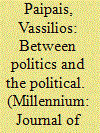

|
|
|
|
|
| Publication |
2014.
|
| Summary/Abstract |
This article situates H. Morgenthau's thought in the context of post-foundationalist theorisations of the difference between politics and the political. In doing so, it shows how Morgenthau's sophisticated realism refused to circumscribe the antagonistic dimension of politics and introduced the study of international politics as a struggle with negativity, temporality and contingency in the wake of the crisis of foundationalism in late modernity. Morgenthau's tarrying with the negative is primarily revealed in his irresolvable tragic oscillation between Nietzschean scepticism and Kantian moralism. Nevertheless, due to its antinomic premises, Morgenthau's tragic vision of politics can still be viewed as stopping a step short of its full-blown critical potential. It is not the purpose of this article, however, to award or withhold credentials of criticality but to recast Morgenthau's theory of the political as an instructive, albeit inconclusive, attempt at a post-foundational political ontology. This may, eventually, serve a purpose far broader than restoring classical realism's latent reflexivity; it may prompt an argument about the conditions and challenges involved in practising international theory as a constant critique of depoliticisation.
|
|
|
|
|
|
|
|
|
|
|
|
|
|
|
|
| 2 |
ID:
182566
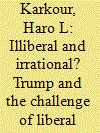

|
|
|
|
|
| Summary/Abstract |
Building on a growing body of literature on the application of Morgenthau’s ethics to post-Cold War US foreign policy, this article applies Morgenthau’s concept of irrationality to Trump’s foreign policy. Based on this application, the article highlights the limit of rationality in Morgenthau’s theoretical analysis. Specifically, the article argues, pace neo-realist critiques of ‘liberal hegemony’, that Trump reveals an empirical puzzle: US foreign policy can be both irrational and illiberal simultaneously in the pursuit of nationalistic universalism. This is the case, the article argues, because nationalistic universalism in Morgenthau’s analysis is not rooted in liberalism per se but the dynamics of liberal modernity. The Trump puzzle thus reveals an on-going tension between rationality and liberal modernity in Morgenthau’s theoretical analysis: rationality offers an insufficient tool to take upon the challenge of liberal modernity from which Trump’s nationalistic universalism stems. This, the article concludes, leaves Morgenthau’s concept of interest ‘defined in terms of power’ open to misappropriation to ends contrary to their original aim: furthering nationalistic universalism, rather than limiting power.
|
|
|
|
|
|
|
|
|
|
|
|
|
|
|
|
| 3 |
ID:
105652
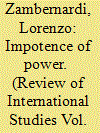

|
|
|
|
|
| Publication |
2011.
|
| Summary/Abstract |
When former US ambassador to Pakistan, Wendy Chamberlin, said of the US, 'We are a player in the Pakistani political system', she was pointing out how challenging it is to achieve US policy goals under the kinds of volatile political conditions engulfing that country. In late 2007, the Bush administration was banking on the political future of former Prime Minister Benazir Bhutto, who had recently returned to Pakistan, and was still providing President Pervez Musharraf with the substantial aid and support it had been giving him since 9/11. And yet by early 2008, Benazir Bhutto was dead, assassinated as she rose from her car to greet crowds of supporters, and Pervez Musharraf was a political liability, since his party had suffered a resounding defeat in the February 2008 election. These events demonstrated that even the foreign policies of a country as powerful as the US can be scuttled by the flux and flow of local power politics.
|
|
|
|
|
|
|
|
|
|
|
|
|
|
|
|
| 4 |
ID:
184044
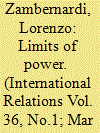

|
|
|
|
|
| Summary/Abstract |
Hans J. Morgenthau’s contribution to international relations and political theory appears to have been fully recognized to date. However, his ideas have undergone surprisingly little comprehensive investigation: an attitude that made it possible to grasp only a few aspects of his reflections. The main argument of this article is that the main area of inquiry in Morgenthau’s scholarship – international politics and foreign policy – is based on general considerations regarding the role of reason in politics and the limits of knowledge of the social universe. Not only does the question of the possibility of such knowledge lie at the root of his considerations on political action, but it also forms the mainspring of his reflection on ethics. Through an inquiry into the red thread that tightly links his diverse body of thought on social sciences, ethics, and foreign policy, the article aims to show that Morgenthau was a systematic political thinker who set out from theoretical observations on the limits of knowledge to develop particular insights into ethics and, from there, a particular notion of how foreign policy should be conducted. In other words, Morgenthau established links of essential continuity between knowledge, ethics, and action.
|
|
|
|
|
|
|
|
|
|
|
|
|
|
|
|
| 5 |
ID:
088095
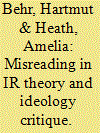

|
|
|
|
|
| Publication |
2009.
|
| Summary/Abstract |
This article is interested in the hegemony which neo-realism accomplished during the second half of the 20th century in both the academic field and policy making of I/international R/relations. Our examination posits the argument that neo-realism can be seen as an ideology rather than a theory of international politics. While this view can connect to individual voices from the 1960s as well as to an emerging body of critical literature since the 1990s, we propose an ideology critique to explore this argument. To unfold this approach we will elaborate some neo-realist misreadings which we think manipulate intellectual history (among others, the writings of Hans J. Morgenthau) and represent an ideological impact intrinsic in the development of IR. An ideology critical approach - which is inherent in Morgenthau's thoughts on international theory themselves and thus helps to reveal profound discrepancies at the heart of an ostensible 'realist'-neo-realist 'unity' - has, firstly, to problematise those discrepancies and, secondly, to focus on hegemonic strategies applied to ideologise and mainstream the academic field. The first part of such an agenda is what we present here; the second part is what we outline methodologically and suggest for further studies in, and of, IR.
|
|
|
|
|
|
|
|
|
|
|
|
|
|
|
|
| 6 |
ID:
091917


|
|
|
|
|
| Publication |
2009.
|
| Summary/Abstract |
Hans Morgenthau was a founder of the modern discipline of International Relations, and his Politics among Nations was for decades the dominant textbook in the field. The character of his Realism has frequently been discussed in debates on methodology and the nature of theory in International Relations. Almost all of this discussion has mischaracterized his views. The clues given in his writings, as well as his biography, point directly to Max Weber's methodological writings. Morgenthau, it is argued, was a sophisticated user of Weber's views who self-consciously applied them in the sphere of International Relations in such a way that Realism provided an ideal-typical model of the rational and responsible statesman. This interpretation both explains Morgenthau's views and shows them to be a serious, complex, and compelling response to the issues which have animated the controversies over International Relations theory after Waltz's presentation of the methodological basis for his neo-Realism.
|
|
|
|
|
|
|
|
|
|
|
|
|
|
|
|
| 7 |
ID:
079482
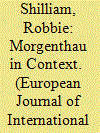

|
|
|
|
|
| Publication |
2007.
|
| Summary/Abstract |
By what criteria might the human condition be considered `tragic'? In this article I argue that historically contextualizing the criteria by which Morgenthau judged the human condition to be tragic requires a sensitivity to what might be called the `international dimension' of knowledge production. Specifically, I argue that Morgenthau's tragic sense of the relation between liberal ethics and the reality of politics was constructed as a reaction to a preceding set of intellectual engagements - exemplified by the political philosophies of Georg Hegel and Max Weber - with the perceived `backward' nature of the `liberal' project in Germany in comparison to that of republican France and capitalist Britain. Through this investigation I argue that inter-societal difference is not simply an object of political theory, but at a deeper level generative in the historical construction of that thought itself. This argument has implications for Morgenthau's recent resurrection as a critical voice on the separation of ethics and politics in International Relations theory
|
|
|
|
|
|
|
|
|
|
|
|
|
|
|
|
| 8 |
ID:
153913
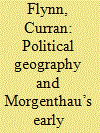

|
|
|
|
|
| Summary/Abstract |
The article is concerned with inconsistencies in Politics among nations (PAN) and Scientific man versus power politics in relation to statements on geopolitics. The article attempts to place these works in the internal and external context of the period in order to ascertain the reason for the inconsistencies. The analysis begins with the context of the chief academic debates in political geography at the time and proceeds to explain the source of the inconsistency between the two books, using the text and archival materials. Following this, the works and criticisms of Halford Mackinder, James Fairgrieve and Nicholas Spykman are examined. The external contextual elements of the Second World War, the beginning of the Cold War and the awakening of American global power are considered as factors in the shift towards a more favourable view on geographical considerations in international relations in PAN. The conclusion that the article reaches is that there are two factors which explain the inconsistency, the integration of American thought on international relations with Morgenthau’s own ideas and the diverging purpose of the books.
|
|
|
|
|
|
|
|
|
|
|
|
|
|
|
|
| 9 |
ID:
118956
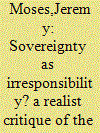

|
|
|
|
|
| Publication |
2013.
|
| Summary/Abstract |
This article aims to cast a critical light on the concept of 'sovereignty as responsibility', which lies at the heart of the Responsibility to Protect (RtoP). It argues that there are two distinct strands of theorising about sovereignty, de facto and de jure, which are not often clearly distinguished in the literature. After establishing the concept of 'sovereignty as responsibility' as a de jure theory of sovereignty, the article goes on to contrast the de facto theory, based upon the sovereignty theories of Hobbes, Schmitt, and Morgenthau. I argue that the de facto theories of sovereignty, concerned as they are with unlimited power and decision as the essence of sovereign authority, can be used to highlight the lack of appreciation of power in the literature surrounding the Responsibility to Protect. This is particularly the case in relation to the just war principles of 'right authority' and 'reasonable prospects of success', both of which lie at the heart of the RtoP criteria for assessing when military interventions for human protection purposes may take place. In conclusion, it is argued that any attempt to advance the RtoP norm must engage with the problem of unlimited power in a more sustained manner.
|
|
|
|
|
|
|
|
|
|
|
|
|
|
|
|
| 10 |
ID:
157786
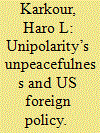

|
|
|
|
|
| Summary/Abstract |
Drawing on Hans J. Morgenthau, this article argues that a key contributor to the unpeacefulness of the post–Cold War unipolar order was the irrationality of US foreign policy. Post–Cold War US foreign policy was irrational in that it failed to base its strategy on the prudent evaluation of the empirical facts in the social and political context in which it was formulated. Instead, it reinterpreted reality in terms of a simplistic picture of the world as accepted by US policymakers a priori, and sought the use of military force as the sole national security strategy to impose the inviolability of the ideals entailed in this picture. This turned post–Cold War US foreign policy into a self-contradictory endeavour as far as the results were concerned: not only did it confuse desirable for essential interests in standardising the enemy – whether Milosevic, Saddam or Qaddafi – to fit the a priori categorisation, but it also opened a gap between the desirable and the possible. For one thing such an irrational post–Cold War US foreign policy failed to accommodate or annul was the empirical reality of conflicting interests in the social and political contexts upon which it sought to impose its a priori picture. This resulted in consequences that were untenable from the standpoint of US objectives and international peace and security, contributing, overall, to the unpeacefulness of the post–Cold War unipolar order.
|
|
|
|
|
|
|
|
|
|
|
|
|
|
|
|
|
|
|
|
|